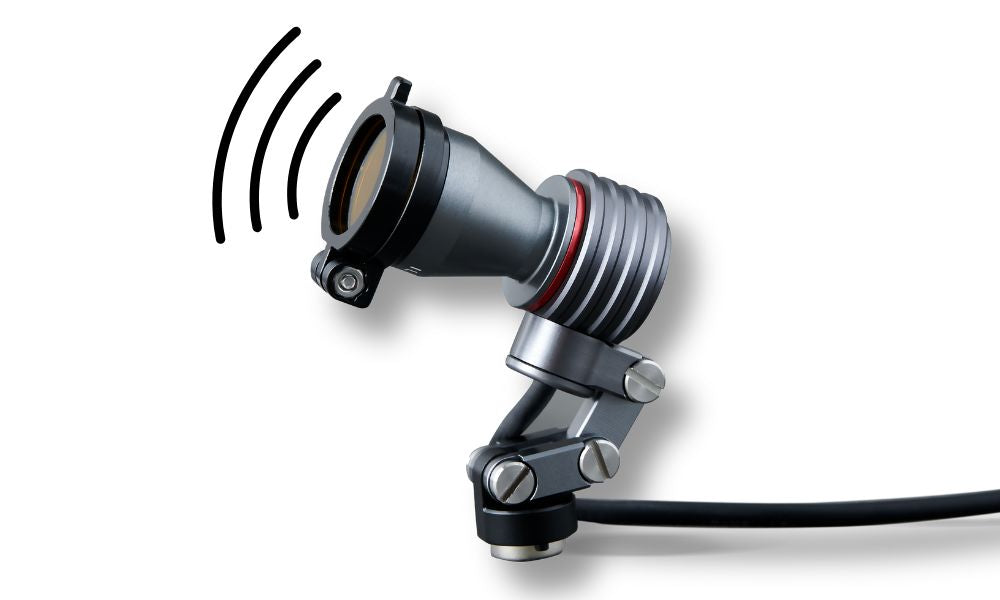Al elegir lupas, la elección entre óptica prismática y galileana puede influir significativamente en su experiencia, según sus necesidades y preferencias específicas. Ambos tipos ofrecen ventajas distintivas, y comprender sus diferencias le ayudará a tomar una decisión informada.
Lupas prismáticas
Las lupas prismáticas, también conocidas como lupas keplerianas, son famosas por su gran aumento y claridad de imagen superior.

Estas lupas utilizan una combinación de lentes y prismas para doblar y ampliar la luz, proporcionando una visión más nítida y detallada.
Ventajas:
Mayor aumento
Las lupas prismáticas pueden alcanzar niveles de aumento más altos, que normalmente van de 3,5x a 8,0x, lo que las hace ideales para procedimientos detallados.
Claridad de imagen más nítida
El uso de prismas mejora la calidad óptica, proporcionando una imagen más nítida y detallada.
Mejor para trabajos detallados
Debido a su capacidad de ofrecer mayor aumento y claridad de imagen, las lupas prismáticas son más adecuadas para tareas que requieren precisión intrincada.
Consideraciones:
Peso
Debido a la complejidad del sistema óptico, las lupas prismáticas generalmente son más pesadas que las lupas galileanas, lo que puede ser un factor durante procedimientos largos.
Costo
La óptica avanzada hace que las lupas prismáticas sean más caras que sus contrapartes galileanas.
Campo de visión y profundidad de campo
Las lupas prismáticas tienden a tener un campo de visión más estrecho y una profundidad de campo menor en comparación con las lupas galileanas con el mismo aumento, lo que puede requerir más movimiento de la cabeza y ajustes frecuentes para mantener el enfoque.
Lupas galileanas
Las lupas galileanas tienen un diseño más simple y utilizan una serie de lentes convexas para ampliar la imagen.

Estas lupas suelen ser más livianas y asequibles, lo que las convierte en una opción popular para principiantes o aquellos que no requieren un aumento extremadamente alto.
Ventajas:
Ligero
El sistema de lentes simple da como resultado un diseño más liviano, que puede reducir la tensión durante el uso prolongado.
Asequibilidad
Las lupas galileanas suelen ser menos costosas, lo que las convierte en una opción rentable para muchos profesionales.
Campo de visión más amplio
Con el mismo aumento, las lupas galileanas generalmente ofrecen un campo de visión más amplio, lo que hace que sea más fácil ver una mayor parte del área de trabajo sin necesidad de mover tanto la cabeza.
Mayor profundidad de campo
Las lupas galileanas también ofrecen una mayor profundidad de campo, lo que le permite mantener el enfoque en un rango más amplio de distancias con ajustes menos frecuentes.
Consideraciones:
Aumento menor
El rango de aumento es más limitado, lo que puede no ser suficiente para procedimientos que requieren detalles intrincados.
Claridad de la imagen
Si bien son eficaces, las lupas galileanas pueden mostrar ligeras distorsiones o menos nitidez, especialmente en los bordes del campo de visión, en comparación con las lupas prismáticas.
Comparación de lupas prismáticas y galileanas con el mismo aumento
Incluso cuando ambos tipos de lupas ofrecen el mismo nivel de aumento, la experiencia de visualización puede diferir significativamente:
Campo de visión
Las lupas galileanas suelen ofrecer un campo de visión más amplio, lo que permite ver una mayor superficie del área de trabajo sin necesidad de mover demasiado la cabeza. Las lupas prismáticas, si bien ofrecen mayor aumento, suelen tener un campo de visión más estrecho.
Profundidad de campo
Las lupas galileanas también ofrecen mayor profundidad de campo, lo que significa que puede mantener un enfoque nítido a mayor distancia con menos ajustes. Las lupas prismáticas pueden requerir ajustes de enfoque más frecuentes al cambiar la distancia de trabajo.
Conclusión
Elegir entre lupas prismáticas y galileanas depende de sus necesidades, preferencias y presupuesto. Si necesita mayor aumento y una imagen más nítida, las lupas prismáticas probablemente sean la mejor opción. Sin embargo, si prefiere una lupa más ligera y económica con un campo de visión más amplio y mayor profundidad de campo, las lupas galileanas podrían ser la opción ideal.
Independientemente de su decisión, ambos tipos de lupas ofrecen valiosas ventajas que pueden mejorar la precisión y la comodidad durante los procedimientos. Illuco ofrece lupas galileanas y prismáticas, lo que le garantiza acceso a la herramienta adecuada para sus necesidades específicas.





Dejar un comentario
Todos los comentarios se revisan antes de su publicación.
Este sitio está protegido por hCaptcha y se aplican la Política de privacidad de hCaptcha y los Términos del servicio.